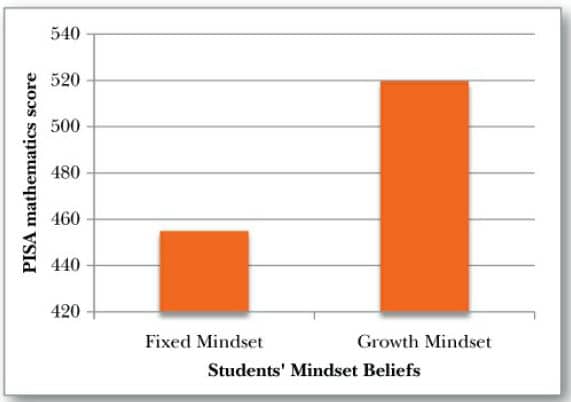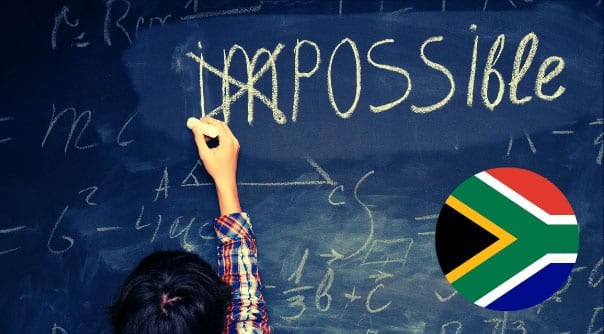
About 40 percent of children and students have a fixed mindset; another 40 percent have a growth mindset, and the remaining 20 percent waver between the two mindsets (Dweck, 2007). What does this mean, and why does it matter for math achievement?
What is a growth mindset?
A growth mindset is based on the belief that one’s qualities can be cultivated through effort. Although people may differ in every way—in their initial talents and aptitudes, interests, or temperaments—everyone can change and grow through application and experience.
People with a growth mindset accept flaws and mistakes as opportunities for improvement, recognize setbacks as part of the learning process, see intelligence as something that can be developed, embrace challenges and probable failure, and are open to feedback (Vallejo, 2023).
What is a fixed mindset?
People with a fixed mindset believe their abilities are innate and cannot be changed. They believe that they are either intelligent or not.
It turns out that even believing one is smart—one of the fixed mindset messages—is damaging. Students with this fixed mindset are less willing to try more challenging work or subjects because they are afraid of slipping up and no longer being seen as intelligent.
Students with a fixed mindset are more likely to give up easily, whereas students with a growth mindset keep going even when work is hard and are persistent (Duckworth & Quinn, 2009).
In the context of mathematics education, the belief in a ‘math brain’—something one does or does not possess—is widely prevalent (Frank, 1990). ‘I am not a math person’ is frequently claimed by students referring to this idea.
How mindset affects math achievement
In a study, researchers surveyed 373 students to measure their mindset and followed them over two years to monitor their mathematics achievement. The results were dramatic, as the achievement of the students with a fixed mindset stayed constant, but those with a growth mindset went onward and upward (Blackwell et al., 2007).
As the popular saying goes, Whether you think you can or think you can’t—you are right.
The Program for International Student Assessment (PISA) is an international assessment that measures 15-year-old students’ reading, mathematics, and science literacy. Boaler and Pablo (Boaler, 2016) found that the highest-achieving students in the world are those with a growth mindset, and they outrank the other students by the equivalent of more than a year of mathematics.

Making mistakes in math is inevitable, part of the learning journey, and vital to developing understanding. Research has shown that synapses grow in the brain when mistakes are made, and there is no growth when answers are correct. Even if a mistake is not rectified, there will be growth. It is the struggle to get the answers right that fosters growth (Boaler, 2016).
How well people bounce back from mistakes depends on their mindset. Individuals with a growth mindset see mistakes as opportunities to learn and improve. For individuals with a fixed mindset, mistakes indicate a lack of ability.
Evidence shows that students with a growth mindset have more positive brain activity when they make mistakes, with more brain regions lighting up and more attention to and correcting errors (Moser et al., 2011).
Tips for developing a growth mindset
1. Start early. In a study, researchers found that the praise parents gave their babies between birth and age three predicted their mindsets five years later (Gunderson et al., 2013).
2. It’s never too late. Studies have shown that students’ mindsets can change from fixed to growth, and when that happens, their learning approach becomes significantly more positive and successful (Blackwell et al., 2007).
3. Embrace flearning. Flearning – learning from failure – is a new term that helps individuals learn from mistakes and failures and grow as a result.
Growth-mindset interventions demonstrate that “struggle” or “failure” is an opportunity for intelligence to grow. Struggles or mistakes should not be conceived as evidence of a continually incapable student.
4. Praise working hard, not being smart. The impact of the praise students receive can be so strong that it affects their behavior immediately. In a study, researchers asked 400 fifth graders to take an easy short test, on which almost all performed well. Half the children were then praised for “being really smart.” The other half were complimented on “having worked really hard.”
The children were then asked to take a second test and choose between one that was pretty simple and that they would do well on and one that was more challenging and they might make mistakes on.
Ninety percent of those praised for their effort chose the harder test. Most praised for being smart chose the easy test (Mueller & Dweck, 1998).
5. Teach how the brain works. Induce a growth mindset in students by teaching them about neuroplasticity, which is the capacity of the brain to transform its neural connections through learning, and how intellectual abilities can be improved through effort and practice.
Edublox offers cognitive training and live online tutoring to students with dyslexia, dysgraphia, dyscalculia, and other learning disabilities. Our students are in the United States, Canada, Australia, and elsewhere. Book a free consultation to discuss your child’s learning needs.
References:
Blackwell, L. S., Trzesniewski, K. H., & Dweck, C. S. (2007). Implicit theories of intelligence predict achievement across an adolescent transition: A longitudinal study and an intervention. Child Development, 78(1): 246-63.
Boaler, J. (2016). Mathematical mindsets: Unleashing students’ potential through creative math, inspiring messages and innovative teaching. San Francisco, CA: Jossey-Bass.
Duckworth, A. L., & Quinn, P. D. (2009). Development and validation of the Short Grit Scale (Grit–S). Journal of Personality Assessment, 91(2): 166–74.
Dweck, C. S. (2007). Mindset: The new psychology of success. Random House Publishing Group.
Frank, M. L. (1990). What myths about mathematics are held and conveyed by teachers? The Arithmetic Teacher, 37(5).
Gunderson, E. A., Gripshover, S. J., Romero, C., Dweck, C. S., Goldin-Meadow, S., & Levine, S. C. (2013). Parent praise to 1- to 3-year-olds predicts children’s motivational frameworks 5 years later. Child Development, 84(5): 1526–41.
Moser, J. S., Schroder, H. S., Heeter, C., Moran, T. P., & Lee, Y.-H. (2011). Mind your errors. Psychological Science, 22(12): 1484–9.
Mueller, C. M., & Dweck, C. S. (1998). Praise for intelligence can undermine children’s motivation and performance. Journal of Personality and Social Psychology, 75(1): 33–52.
Vallejo, M. (2003). Characterists of a growth mindset. Mentalhealthcenterkids.com.


